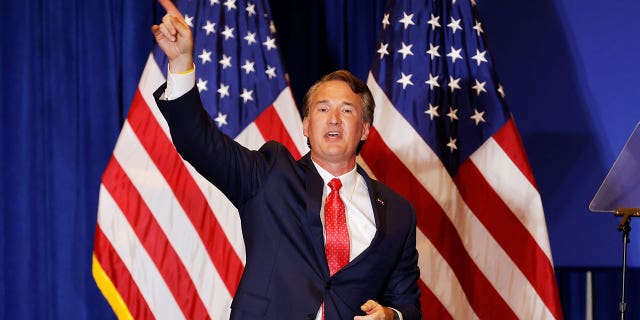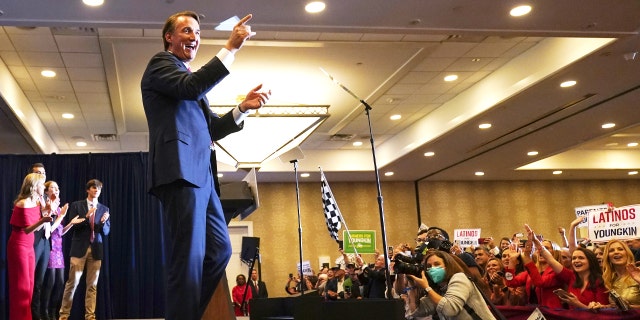The most pivotal election of 2021 and what it says about the bigger showdowns ahead in 2022

Fox News Flash top headlines for December 21
Fox News Flash top headlines are here. Check out what’s clicking on Foxnews.com.
In an off-election year that was the busiest in recent memory, one electoral showdown stood out from the rest as the most consequential contest of 2021.
In a year that included statewide and legislative matchups in New Jersey and Virginia, a gubernatorial recall contest in California, and six special congressional elections for vacant House seats, Virginia’s faceoff for governor grabbed outsized media attention from coast to coast and was arguably the most pivotal race.
For those missing in action the past two months, Glenn Youngkin, a first-time candidate who hailed from the business wing of the Republican Party, narrowly defeated former Democratic Gov. Terry McAuliffe in a statewide contest with plenty of national implications. While Virginia gubernatorial elections are seen every four years as a likely bellwether of things to come in the ensuing midterm elections, some pundits are spotlighting what they consider the critical consequences of the 2021 results ahead of the 2022 midterms.
Youngkin became the first Republican to win a gubernatorial election in a dozen years in Virginia, a one-time battleground but still competitive state. And the race was seen as a key barometer ahead of next year’s midterms, when Republicans aim to win back control of both the House of Representatives and the Senate, where the Democrats hold razor-thin majorities.
Virginia Republican gubernatorial nominee Glenn Youngkin speaks during his election night party at a hotel in Chantilly, Virginia, Nov. 3, 2021.
(REUTERS/ Jonathan Ernst)
Republicans instantly saw Youngkin’s emphasis on tapping into the anger of parents over decisions by their local school boards as a blueprint of how to run campaigns in next year’s elections.
“We’re going to embrace our parents, not ignore them. We’re going to press forward with a curriculum that includes listening to parents,” Youngkin stressed in his election night victory speech, highlighting his full-court press on education.
Public school education has traditionally been a leading issue in gubernatorial contests across the country. But amid a year and a half of frustration over school closures and mask mandates due to the coronavirus pandemic and the push by conservatives nationwide to target race-focused curriculum, including this year’s well-publicized battles in Northern Virginia’s Loudoun County – ground zero for the education culture wars – Republicans now see education and parents’ rights as a winning issue to try and recapture suburban voters who fled the GOP during former President Trump’s White House tenure.
An unforced error by McAuliffe further fueled the GOP fire, as Republicans spotlighted a clip from the second and final debate between the two candidates where the former governor said, “I don’t think parents should be telling schools what they should teach.”
Democratic gubernatorial candidate Terry McAuliffe, right, hugs his wife, Dorothy, as he makes an appearance at an election night party in McLean, Virginia, Tuesday, Nov. 2, 2021.
(AP Photo/Steve Helber)
In the weeks after the clip went viral, public opinion polls in Virginia showed education surging to become the second-most-pressing issue on the minds of voters. And the same surveys indicated that McAuliffe, who kicked off his gubernatorial campaign at a public school in Richmond as he spotlighted his education proposals, had lost his advantage on the issue. A Fox News Voter Analysis conducted on Election Day indicated that education was the most important issue for 70% of Youngkin supporters.
Youngkin spent more than $4 million to run education-related TV ads, and the vast majority of the spots focused on McAuliffe’s gaffe. That helped Youngkin make major gains among the suburban voters who fueled both the Democrats’ blue wave in the 2018 House elections and President Biden’s victory over Trump in last year’s White House showdown.
While not spotlighting it to the same degree, Youngkin also took aim at critical race theory to energize Trump’s base and other conservative voters. Youngkin scored bigger margins over McAuliffe than Trump did over Biden last year in some of the reddest counties in the western part of the state.
But it’s Youngkin’s performance in the suburbs that’s exciting Republicans looking ahead to the midterms.
Virginia Gov.-elect Glenn Youngkin arrives to speak at an election night party in Chantilly, Virginia, early Wednesday, Nov. 3, 2021, after he defeated Democrat Terry McAuliffe.
((AP Photo/Andrew Harnik))
Wes Anderson, a veteran Republican consultant and pollster who conducts surveys for the National Republican Senatorial Committee (NRSC), said that “there’s sort of a perfect storm brewing when it comes to education.”
The GOP victories in the commonwealth coupled with GOP gubernatorial nominee Jack Ciattarelli’s near upset of Democratic Gov. Phil Murphy of New Jersey – along with GOP legislative pickups in the very blue Garden State – are seen as ominous signs for the Democrats as they try to hold their razor-thin House and Senate majorities in the 2022 midterms.
Longtime Democratic consultant Bill Burton acknowledged that “undoubtedly Democrats are in a difficult political position going into 2022 by any measure of any public opinion polling.”
But he argued that regardless of the difficult political climate facing the Democrats, “Terry McAuliffe nearly won that race and short of that mistake (the final debate gaffe) he probably would have won.”
Burton, national press secretary for former President Obama’s historic 2008 White House victory, predicted that looking forward “the more likely scenario is that Republicans overlearn the lesson of critical race theory, which I think will end up being problematic for them next fall with suburban voters.”
But Democratic strategist Michael Ceraso says there are lessons for his party to learn from the Virginia losses.
At the top of his list – that Democrats “need to be thinking generational and not election to election to be able to sustain a winning streak.”
Note: The crucial twin Senate runoff elections in Georgia – which the Democrats swept, giving them the majority in the chamber – were held on Jan. 5. While part of the 2021 calendar year, they were generally considered the final act of the 2020 election cycle and were not included in this story.
Source: Read Full Article




